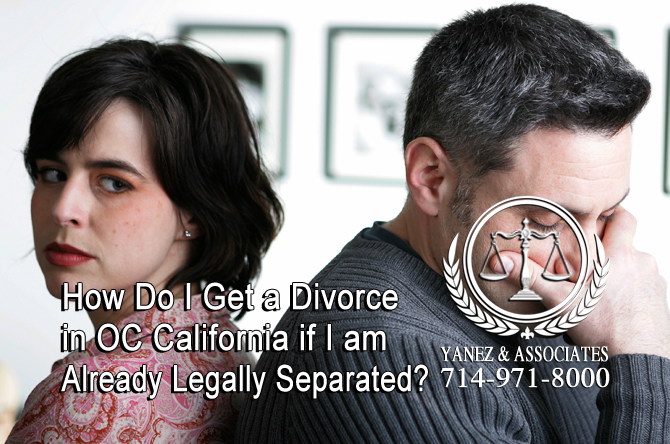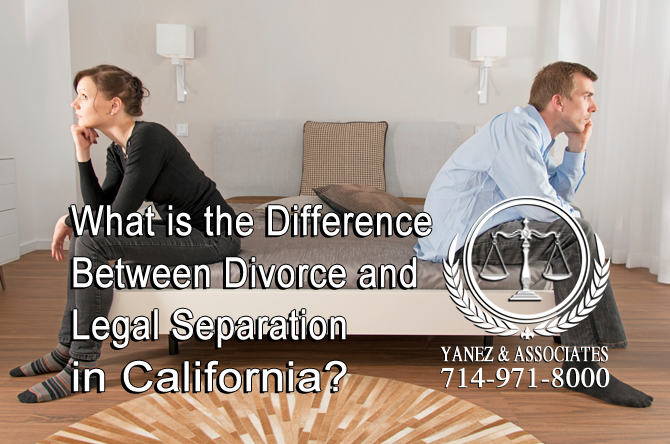FAQ: I originally filed for a legal separation in Orange County, California and the judgment is now final. Now I want to divorce my spouse/domestic partner; Change the judgment from legal separation to a judgment for divorce?
How Do I Get a Divorced in California if Already Legally Separated?

How Do I Get a Divorce in OC California if I am Already Legally Separated?
How to Get Divorced in California if Already Legally Separated? There are many reasons why a couple would opt for a legal separation in lieu of a divorce in California, even if they plan to divorce eventually. In fact, it can make for a quicker and less costly divorce process.
So, how do you move from being legally separated to legally divorced in California? What is the difference between a legal separation and a divorce? Why do some people choose one over the other, and why do some people choose both?
Simply put, if you are ready to file for divorce and you have already filed for a legal separation, or one has been granted, you need to file an amended petition for a divorce with the court. The process of obtaining a divorce is similar to that for a legal separation.
The answers to the questions listed above will depend on your unique situation, as well as what you and your spouse want for yourselves and your family. It is always best to discuss your situation with a qualified California divorce attorney prior to making any decisions, but it’s even better if you have some information beforehand and an idea of what to ask.
What is the Difference Between Divorce and Legal Separation in California?

Divorce and legal separation are two different ways to end a marriage in California. While the process for both is similar, the outcome is different.
Divorce and legal separation are two different ways to end a marriage in California. While the process for both is similar, the outcome is different.
A divorce dissolves a marriage, and is sometimes called a dissolution of marriage. At the end of a divorce, both parties are legally single and free to remarry. A divorce cannot be finalized for at least six months from the date of filing, and in order to divorce in California, a couple is required to meet certain residency requirements. During a divorce, a couple needs to divide community property, debts and other assets, make decisions about spousal support, partner support, child support and family support, and agree to a parenting and visitation plan.
A legal separation, on the other hand, does not technically end a marriage. When a couple is legally separated, they are not free to remarry, but they can share insurance plans and file their taxes jointly. Unlike a divorce, a legal separation does not need to meet the same residency requirements as in a divorce. A legal separation also requires a couple to divide community property, debts and other assets, make decisions about spousal support, partner support, child support and family support, and agree to a parenting and visitation plan.
How Do I Get a Divorce If I’m Already Legally Separated? File an Amended Petition

The processes for filing for either a divorce or a legal separation are similar in California. In fact, they even require a lot of the same forms, and simply ask you to check a different box.
The processes for filing for either a divorce or a legal separation are similar in California. In fact, they even require a lot of the same forms, and simply ask you to check a different box.
Many times, a couple who wants to divorce but does not yet meet the residency requirements for a divorce will file for legal separation instead because they can take care of the things that are necessary for both: dividing community property, debts and other assets, and making agreements for spousal or partner support, child support, child custody, and visitation.
If you already have a legal separation, and you want to file for divorce, you already have an approved court order regarding the division of property, spousal support, child support, child custody and visitation. You simply need to file an amended petition, which requests that the court grant you a divorce.
Usually, filing an amended petition is a relatively simple process. If your spouse has not yet responded to your initial petition for a legal separation, you simply need to file the Amended Petition and serve it on your spouse. If he or she has already responded, you may need to ask the court for permission to file an amended petition. Your attorney can help you with this process, but many courts will allow it without a separate hearing.
You can file for a divorce as soon as you meet the legal requirements for a divorce, and as soon as you decide that you want one.
So, what are the residency requirements for divorces and legal separation in California?
Residency Requirements for a Divorce in California
In order to divorce in California, a married couple needs to meet these requirements.
• One of you must have lived in the State of California for at least the last six months, and
• One of you must have lived in the county where you will file for divorce for at least the last three months. If you don’t live in the same county as your spouse and you have both lived in your respective counties for at least the last three months, you may file in either county.
There is an exception to these requirements for same sex couples who were married in California and currently live in a state that does not recognize or will not dissolve their marriage. These couples may file for divorce in the county in which they married in California regardless of their current residency.
In order to divorce in California, registered domestic partners need to meet these requirements.
• If your domestic partnership is registered in California, you can file for divorce in California even if you do not currently or never have lived in California. You have no residency requirement to meet.
• If your domestic partnership was not registered in California, you must meet the following requirements
• One of you must have lived in the State of California for at least the last six months, and
• One of you must have lived in the county where you will file for divorce for at least the last three months.
Remember that regardless of these requirements, if you or your partner or spouse do not live in California, it may be difficult to make enforceable orders regarding the division of debt and property, child support, child custody and visitation.
Residency Requirements for a Legal Separation in California
In order to file for a legal separation in California, a married couple needs to meet the following requirements.
• At least one of you is currently living in California.
In order to file for a legal separation in California, registered domestic partners need to meet the following requirements.
• If your domestic partnership is registered in California, you may file for a legal separation in California regardless of where you or your partner currently live.
• If your domestic partnership is not registered in California, either you or your partner needs to be currently living in California in order to file for a legal separation.
The same stipulation applies to domestic partnerships that applies to divorces: if neither of you lives in California, it may be difficult to create enforceable orders regarding the division of debt and property, child support, child custody and visitation.
Which Is Better: Divorce or Legal Separation?

Deciding between a divorce and a legal separation is different for every family situation, and you should always discuss the way that the law affects you with an attorney prior to making a decision.
If you can’t decide whether you’d rather file for a divorce or a legal separation, consider your current situation. One of the most common reasons for choosing a legal separation over a divorce is a failure to meet the residency requirements.
Because the process of filing for divorce and filing for a legal separation are similar in California, filing for a legal separation ahead of time lets you get a head start on filing for divorce, especially as far as creating the court orders that are associated with a divorce goes.
Your lifestyle as a legally separated person and as a divorced person may not be very different, so a legal separation is a way to get ahead of the game. Legal separations also allow both partners time to find their own insurance plans, and they allow a couple to be legally married in order to receive certain benefits, like those in the military, that require a marriage to last a minimum length of time prior to awarding benefits. It also allows a partner or spouse who faces domestic violence or abuse to get away from the other party as soon as possible, long term, and before filing for a divorce.
Deciding between a divorce and a legal separation is different for every family situation, and you should always discuss the way that the law affects you with an attorney prior to making a decision.
Orange County Legal Separation & Divorce Attorneys

Contact the attorneys at Yanez & Associates today to schedule your free initial consultation with a qualified divorce attorney in Southern California.
The processes for a divorce and a legal separation are similar in California. For either one, you will want to discuss your situation with a qualified attorney who has experience with the division of community property and debts, and creating court orders regarding things like child support, child custody, and spousal or partner support.








